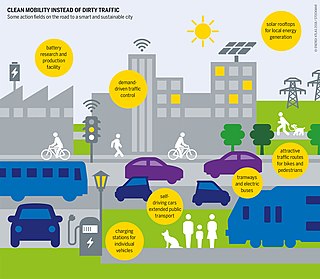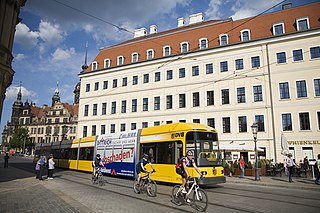An environmental tax, ecotax, or green tax is a tax levied on activities which are considered to be harmful to the environment and is intended to promote environmentally friendly activities via economic incentives. One notable example is a carbon tax. Such a policy can complement or avert the need for regulatory approaches. Often, an ecotax policy proposal may attempt to maintain overall tax revenue by proportionately reducing other taxes ; such proposals are known as a green tax shift towards ecological taxation. Ecotaxes address the failure of free markets to consider environmental impacts.

Minamata is a city located in Kumamoto Prefecture, Japan. It is on the west coast of Kyūshū and faces Amakusa islands. Minamata was established as a village in 1889, re-designated as a town in 1912 and grew into a city in 1949. As of March 2017, the city has an estimated population of 25,310 and a population density of 160 persons per km2. The total area is 162.88 km2.

Sustainable transport refers to ways of transportation that are sustainable in terms of their social and environmental impacts. Components for evaluating sustainability include the particular vehicles used for road, water or air transport; the source of energy; and the infrastructure used to accommodate the transport. Transport operations and logistics as well as transit-oriented development are also involved in evaluation. Transportation sustainability is largely being measured by transportation system effectiveness and efficiency as well as the environmental and climate impacts of the system. Transport systems have significant impacts on the environment, accounting for between 20% and 25% of world energy consumption and carbon dioxide emissions. The majority of the emissions, almost 97%, came from direct burning of fossil fuels. In 2019, about 95% of the fuel came from fossil sources. The main source of greenhouse gas emissions in the European Union is transportation. In 2019 it contributes to about 31% of global emissions and 24% of emissions in the EU. In addition, up to the COVID-19 pandemic, emissions have only increased in this one sector. Greenhouse gas emissions from transport are increasing at a faster rate than any other energy using sector. Road transport is also a major contributor to local air pollution and smog.

The Singapore Green Plan (SGP) was created in 1992 to ensure that the economic growth model of Singapore does not compromise the environment. The SGP sets out the strategies, programs and targets for Singapore to maintain a quality living environment while pursuing economic prosperity. The focus areas in the SGP are led by a main coordinating committee and respective action program committees. Since 1992, the SGP has been continuously updated to ensure its relevance, releasing SGP 2012 in 2002 and SGP 2030 in 2021. The United Nations (UN) Sustainable Development Goals (SDG) are correlated or mapped to the SGP.

Eco-Schools is an international programme of the Foundation for Environmental Education (FEE) that aims to “empower students to be the change our sustainable world needs by engaging them in fun, action-orientated, and socially responsible learning.”

A sustainable city, eco-city, or green city is a city designed with consideration for social, economic, environmental impact, and resilient habitat for existing populations, without compromising the ability of future generations to experience the same. The UN Sustainable Development Goal 11 defines sustainable cities as those that are dedicated to achieving green sustainability, social sustainability and economic sustainability. They are committed to doing so by enabling opportunities for all through a design focused on inclusivity as well as maintaining a sustainable economic growth. The focus will also includes minimizing required inputs of energy, water, and food, and drastically reducing waste, output of heat, air pollution – CO2, methane, and water pollution. Richard Register, a visual artist, first coined the term ecocity in his 1987 book Ecocity Berkeley: Building Cities for a Healthy Future, where he offers innovative city planning solutions that would work anywhere. Other leading figures who envisioned sustainable cities are architect Paul F Downton, who later founded the company Ecopolis Pty Ltd, as well as authors Timothy Beatley and Steffen Lehmann, who have written extensively on the subject. The field of industrial ecology is sometimes used in planning these cities.
Cleaner production is a preventive, company-specific environmental protection initiative. It is intended to minimize waste and emissions and maximize product output. By analysing the flow of materials and energy in a company, one tries to identify options to minimize waste and emissions out of industrial processes through source reduction strategies. Improvements of organisation and technology help to reduce or suggest better choices in use of materials and energy, and to avoid waste, waste water generation, and gaseous emissions, and also waste heat and noise.

In developing countries and some areas of more developed countries, energy poverty is lack of access to modern energy services in the home. In 2022, 759 million people lacked access to consistent electricity and 2.6 billion people used dangerous and inefficient cooking systems. Their well-being is negatively affected by very low consumption of energy, use of dirty or polluting fuels, and excessive time spent collecting fuel to meet basic needs.
Energy Saving Trust is a British organization devoted to promoting energy efficiency, energy conservation, and the sustainable use of energy, thereby reducing carbon dioxide emissions and helping to prevent man-made climate change. It was founded in the United Kingdom as a government-sponsored initiative in 1992, following the global Earth Summit.

Household air pollution (HAP) is a significant form of indoor air pollution mostly relating to cooking and heating methods used in developing countries. Since much of the cooking is carried out with biomass fuel, in the form of wood, charcoal, dung, and crop residue, in indoor environments that lack proper ventilation, millions of people, primarily women and children face serious health risks. In total, about three billion people in developing countries are affected by this problem. The World Health Organization (WHO) estimates that cooking-related pollution causes 3.8 million annual deaths. The Global Burden of Disease study estimated the number of deaths in 2017 at 1.6 million. The problem is closely related to energy poverty and cooking.
This article includes information about environmental groups and resourcesthat serve K–12 schools in the United States and internationally. The entries in this article are for broad-scope organizations that serve at least one state or similar regions.
This page is an index of sustainability articles.

Project Gaia is a U.S.-based non-governmental, non-profit organization engaged in developing alcohol-based fuel markets for household use in Ethiopia and other developing countries. The organization identifies alcohol fuels as a potential alternative to traditional cooking methods, which they suggest may contribute to fuel shortages, environmental issues, and public health concerns in these regions. Focusing on impoverished and marginalized communities, Project Gaia is active in Ethiopia, Nigeria, Brazil, Haiti, and Madagascar. The organization is also planning to expand its projects to additional countries.

Micro-sustainability is the portion of sustainability centered around small scale environmental measures that ultimately affect the environment through a larger cumulative impact. Micro-sustainability centers on individual efforts, behavior modification, education and creating attitudinal changes, which result in an environmentally conscious individual. Micro-sustainability encourages sustainable changes through "change agents"—individuals who foster positive environmental action locally and inside their sphere of influence. Examples of micro-sustainability include recycling, power saving by turning off unused lights, programming thermostats for efficient use of energy, reducing water usage, changing commuting habits to use less fossil fuels or modifying buying habits to reduce consumption and waste. The emphasis of micro-sustainability is on an individual's actions, rather than organizational or institutional practices at the systemic level. These small local level actions have immediate community benefits if undertaken on a widespread scale and if imitated, they can have a cumulative broad impact.
A sustainability organization is (1) an organized group of people that aims to advance sustainability and/or (2) those actions of organizing something sustainably. Unlike many business organizations, sustainability organizations are not limited to implementing sustainability strategies which provide them with economic and cultural benefits attained through environmental responsibility. For sustainability organizations, sustainability can also be an end in itself without further justifications.

Global Action Plan International or GAP International is a network of NGOs that specialises in sustainable behaviour change and is best known for its projects revolving around ESD. GAP International's mission is to empower people to live and work increasingly sustainably, at school, at home and at work. There are programmes designed for households and communities, schools and youth, and workplaces.
Keep Scotland Beautiful is an environmental charity based in Scotland, which aims “to make Scotland a cleaner, greener and more sustainable place to live, work and visit.” The organisation campaigns and educates on a range of environmental issues including climate change and litter reduction.

One aspect of energy poverty is lack of access to clean, modern fuels and technologies for cooking. As of 2020, more than 2.6 billion people in developing countries routinely cook with fuels such as wood, animal dung, coal, or kerosene. Burning these types of fuels in open fires or traditional stoves causes harmful household air pollution, resulting in an estimated 3.8 million deaths annually according to the World Health Organization (WHO), and contributes to various health, socio-economic, and environmental problems.










